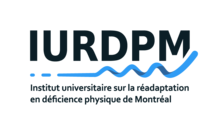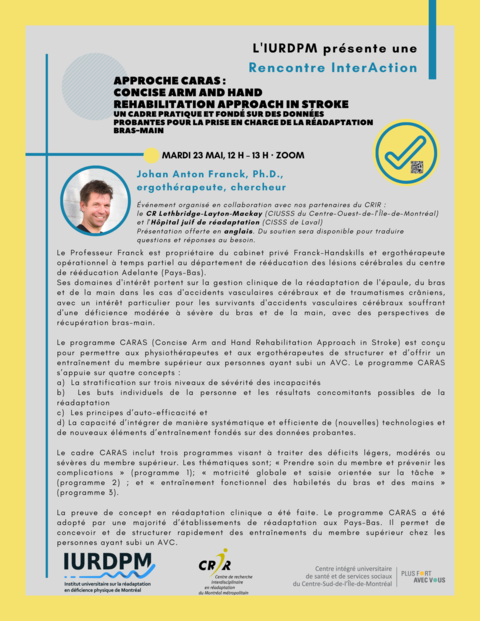Concise Arm and Hand Rehabilitation Approach in Stroke (CARAS) Un cadre pratique et fondé sur des données probantes pour la prise en charge de la réadaptation bras-main.
23 mai 2023
Concise Arm and Hand Rehabilitation Approach in Stroke (CARAS) A practical and evidence-based framework for arm-hand rehabilitation management
Cet événement est organisé en collaboration avec nos partenaires du CRIR : le CR Lethbridge-Layton-Mackay (CIUSSS du Centre-Ouest-de-l'Île-de-Montréal) et l'Hôpital juif de réadaptation (CISSS de Laval)
Présentation offerte en anglais. Du soutien sera disponible pour traduire questions et réponses au besoin.This event is organized in collaboration with CRIR partners: the Lethbridge-Layton-Mackay Centre (CIUSSS du Centre-Ouest-de-l'Île-de-Montréal) and the Jewish Rehabilitation Hospital (CISSS de Laval).
*English version below*
Johan Anton Franck, Ph.D., ergothérapeute, chercheur
Ses domaines d'intérêt portent sur la gestion clinique de la réadaptation de l'épaule, du bras et de la main dans les cas d'accidents vasculaires cérébraux et de traumatismes crâniens, avec un intérêt particulier pour les survivants d'accidents vasculaires cérébraux souffrant d'une déficience modérée à sévère du bras et de la main, avec des perspectives de récupération bras-main.
☛ Prof. Franck is an occupational therapist, senior researcher (PhD), owner of Franck-Handskills private practice and part-time operational OT at the Department of Brain Injury Rehabilitation of Adelante Rehabilitation Centre (Netherlands).
His field of interest are: Clinical management of shoulder, arm and hand rehabilitation in stroke/TBI with a special interest in stroke survivors suffering from a moderately to severely impaired arm and hand with prospect regarding arm-hand recovery.
a) La stratification sur trois niveaux de sévérité des incapacités
b) Les buts individuels de la personne et les résultats concomitants possibles de la réadaptation
c) Les principes d’auto-efficacité et
d) La capacité d’intégrer de manière systématique et efficiente de (nouvelles) technologies et de nouveaux éléments d’entraînement fondés sur des données probantes.
☛ The Concise Arm and hand Rehabilitation Approach in Stroke (CARAS) is designed for PTs & OTs to structure and implement arm-hand training in stroke survivors. CARAS is based on four constructs:
a) stratification according to three levels of severity of arm– hand impairment,
b) the individual’s rehabilitation goals and concomitant potential rehabilitation outcomes,
c) principles of self-efficacy, and
d) possibilities to systematically incorporate (new) technology and new evidence-based training elements swiftly.
The framework encompasses three programs aimed at treating either the severely, moderately or mildly impaired arm-hand. Program themes are: ‘taking care of the limb and prevention of complications’ (program 1), ‘task-oriented gross motor grip performance’ (program 2) and ‘functional arm-hand-skill-performance training’ (program 3).
Proof-of-principle in clinical rehabilitation has been established. CARAS is adopted by the majority of rehabilitation centers in the Netherlands and facilitates rapid structured design and provision of state-of-the-art arm-hand-function and arm-hand-skill-performance treatment in stroke patients.

